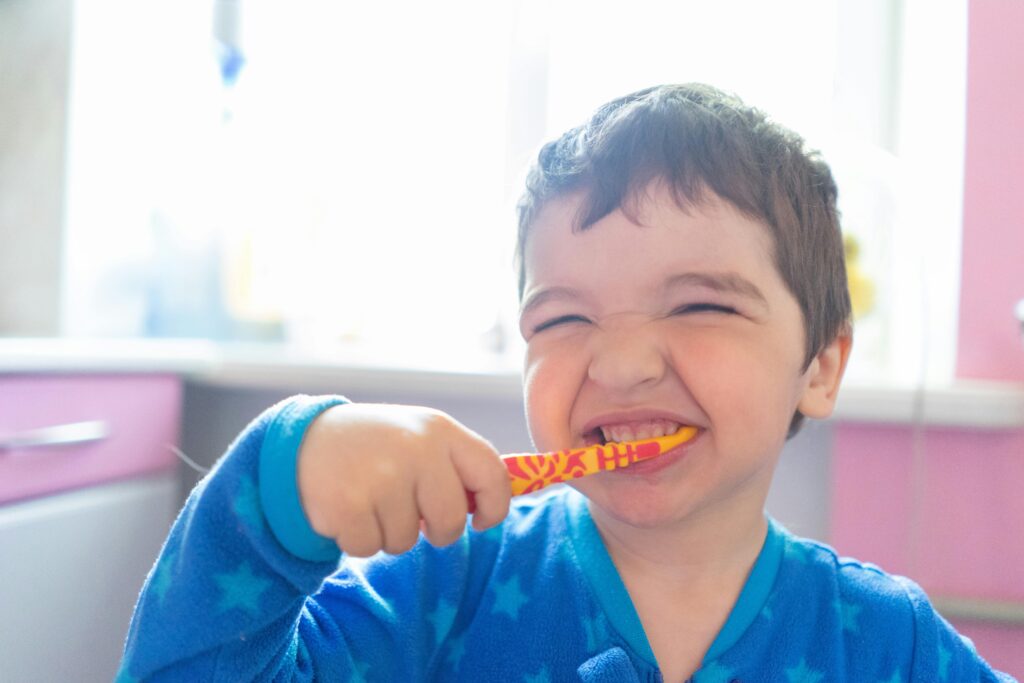If you have a neurodivergent child, you may have heard of Low Demand Parenting. This parenting approach aims to reduce stress for kids with highly sensitive nervous systems to keep them out of fight-or-flight mode by reducing demands and expectations they are having trouble meeting. Although this approach is often talked about as a way of parenting neurodiverse kids, it has a lot to offer parents of all kids. As a chronically ill parent to two kids with high support needs, I’ve found Low Demand Parenting to be enormously helpful at reducing stress in our home and adjusting to my body’s changing capabilities.
What is Low Demand Parenting?
At its heart, Low Demand Parenting is about reducing demands and accepting our kids as they are. It’s particularly helpful when parenting kids who fall into the Pathological Demand Avoidance (PDA) profile on the autism spectrum because their nervous systems are quick to respond to any sort of demand as a threat, throwing them into a fight-or-flight response.
A “demand” in this case can be a direct request like, “put on your shoes,” but can also be things like social norms, internal expectations of how something will go, or bodily needs like sleeping and eating. In someone with PDA, these demands cause intense anxiety, which in turn contributes to avoidant behaviors and often explosive anger.
Low-Demand Parenting asks parents to be detectives. We notice our kid struggling with some aspect of life – brushing teeth, doing homework, wearing appropriate clothing, sleeping at bedtime – and we get curious about what the demand in the situation is and how we can remove it. To do that, we need to look hard at what we’re asking of our kids and why it’s important.
If “brushing teeth with a toothbrush and toothpaste in the bathroom” is difficult, we have to figure out what makes it hard for our child. Is it the toothbrush or toothpaste? Standing in one place for two minutes? Being pulled away from another activity to brush teeth? Then we have to figure out why tooth brushing is important. Preventing cavities is one very important reason, but there are a lot of ways to do that. Maybe we change the toothpaste or toothbrush. Maybe we brush teeth in the living room or the kitchen. Maybe we ask our dentist for alternative ways to prevent cavities while we figure out tooth brushing.
A Low Demand Life with Chronic Illness
When I started using the Low Demand Parenting approach, I quickly learned that a lot of the needs underlying day to day demands could be met in creative ways that didn’t cause distress for my kids. I was surprised by how many of the demands I found had no good reason behind them – they were there because of social norms or because that’s how I thought things were supposed to be. I started looking at demands in my own life, too, and realized that I could find other ways of meeting those needs that were less taxing, especially when my energy reserves were low or my pain levels were high.
When my pain levels are high, the demand to climb the stairs to put laundry away is more than I can handle. So each person gets a basket in the laundry room for clean clothes and we live out of those for a while until I’m once again able to climb the stairs. There’s no universal rule that says that clean clothes must live in dresser drawers – in fact one of my kids prefers to keep clothes in baskets all the time. The baskets meet my need for general tidiness and having things off the floor, and the organization means we can each find our own clothes when we need them. It won’t win my house any decor awards, but it works for us.
Once I started looking for demands that were causing stress for me or my kids, I found them everywhere. Sometimes I can’t climb the stairs at bedtime, so the kids build pillow forts to sleep in or drag a blow up mattress into my room so I can read to them from bed. Compostable paper plates and silverware get us through stressful times and pain flares. Socks and shoes now live by the back door so we don’t have to run up and down the stairs on busy mornings, and my kids sleep in their clothes for the next day to make life easier for all of us. Waterless shampoo and bath wipes help all of us on days when showers feel absolutely impossible. And we have multiple ways of cleaning teeth and keeping breath fresh, just in case.
Tips for Going Low Demand with Chronic Illness
Accept life as it is, at least for right now. Letting go of my expectations of what parenting and family life “should” look like was not easy. There are so many voices in our lives – social media, friends, and family – setting expectations of what family life should be that charting my own course was daunting. I had to stop comparing my life to the lives of others and come to a place of radical acceptance of who my kids and I are here and now, with all our strengths and limitations. That means really being honest with myself about what my body can handle and what it can’t, and understanding that my capacity varies from day to day.
Make a list of what REALLY matters. Think about what is really important to you and why, and make a list of non-negotiables. For me, what really matters is that my kids and I are safe (physically and emotionally) and that we know we are loved. Everything else is pretty negotiable, and there are a lot of different ways to make sure everyone is fed and clean and educated and clothed.
Name the demands. When you come across a demand, name it. Be specific and descriptive. I often name demands out loud to model the process for my kids.. “I’m finding it really hard to go do the dishes, because my joint pain is making it hard to stand for very long and also it’s a really boring chore that I don’t enjoy doing.” Naming the demands helps you figure out why they’re difficult, and often points toward alternative ways to meet your needs. A rolling stool or anti-fatigue mat can help with standing at the sink, and a podcast can help keep my mind occupied. And if I know my joint pain is getting bad before I make food, I can pull out my stash of paper plates and use those instead.
Ask for help. Sometimes we need a fresh perspective to figure out where the demands in life are or come up with alternate ways of meeting our needs. My kids have gotten really good at finding creative solutions to challenging demands (pillow-fort sleepovers on flare days was their idea). And my friends are able to see my life from the outside and ask me why on earth I’m worried about putting away laundry when I can barely use my hands.
Know that you are enough. Parenting with chronic illness can lead to a lot of guilt about all the things we aren’t able to do. Seen through a low demand lens, though, a lot of those things represent needs we can meet in other ways. Whether it’s finding a wheelchair-friendly walking path for a nature walk or reading to our kids while lying in bed, we can connect with and nurture our kids and be the parents they need.

